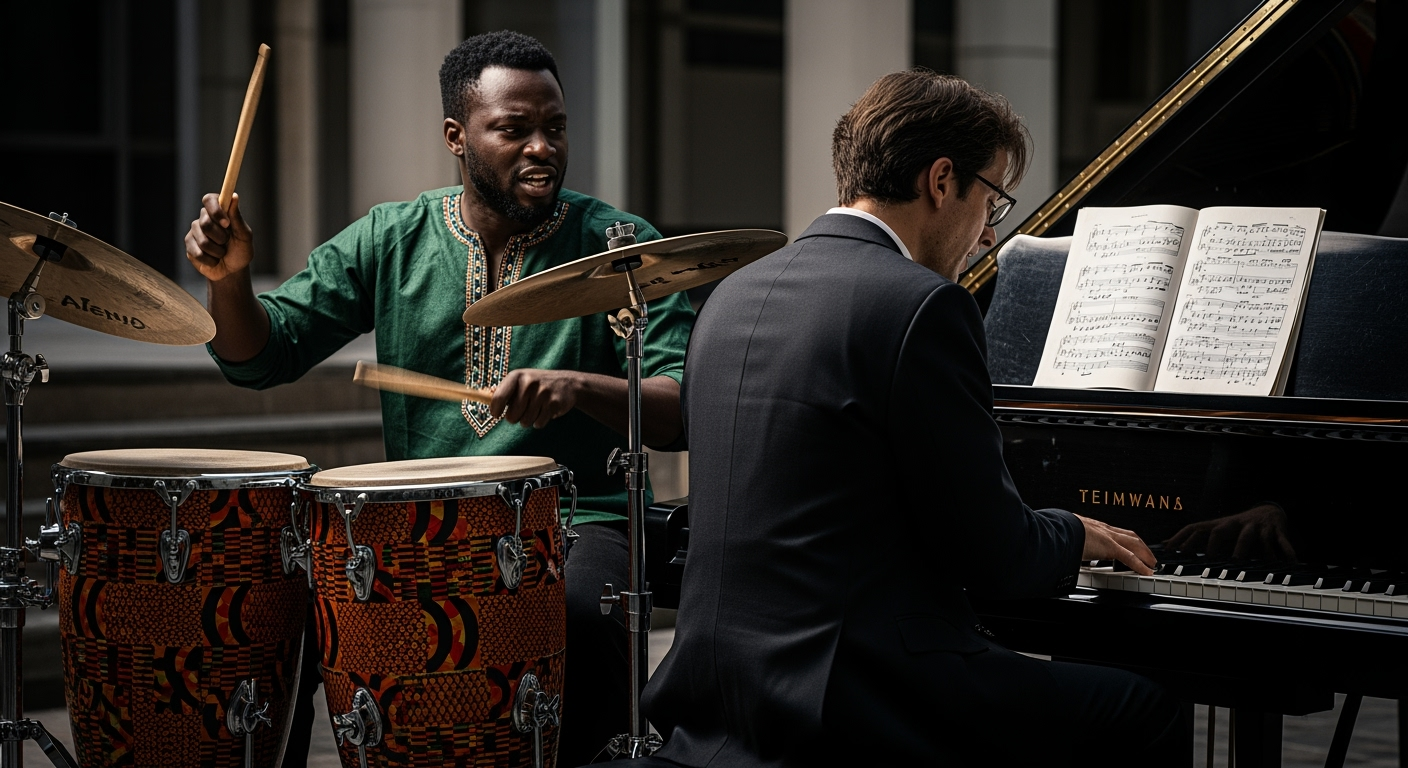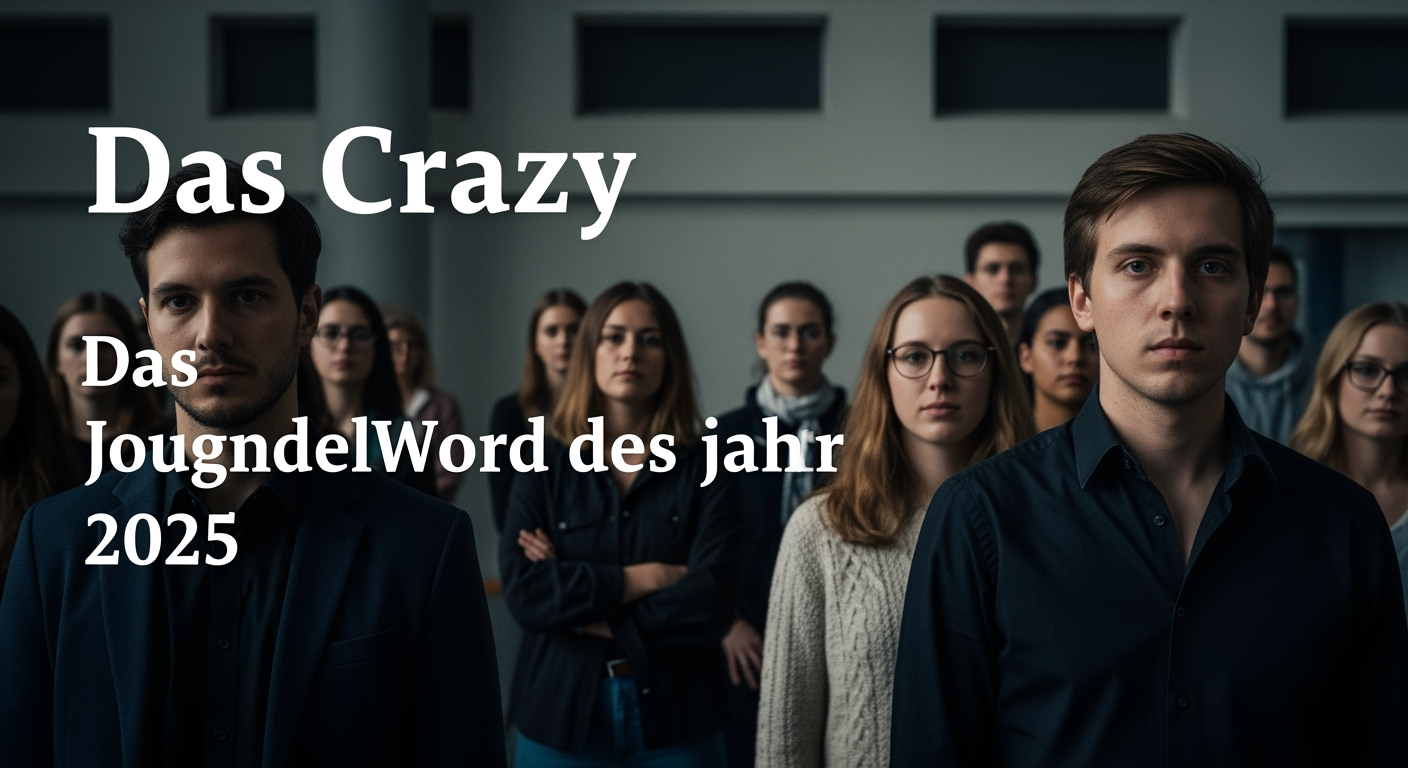Related Articles

Daring Daylight Heist Shakes Louvre, Priceless Jewels Vanish

Rhythms of Reconciliation: Afrobeat and Beethoven Converge in Landmark 2025 Campus Project





FRANKFURT AM MAIN – "Das crazy" has officially been declared the German Youth Word of the Year 2025, a phrase that encapsulates both the evolving nature of youth language and the significant influence of English on contemporary German. Announced at the esteemed Frankfurt Book Fair on October 18, 2025, the selection by the Langenscheidt publishing house marks the culmination of a months-long democratic process, reflecting the linguistic pulse of the nation's 11- to 20-year-olds. This seemingly simple expression, blending German and English, serves as a versatile linguistic tool for a generation navigating a rapidly changing world, simultaneously expressing astonishment, agreement, or even ironic indifference.
The announcement of "Das crazy" as the Jugendwort des Jahres 2025 (Youth Word of the Year 2025) highlights a prevailing trend among young Germans: a penchant for concise, often English-infused expressions that convey a spectrum of emotions and reactions. Essentially an all-purpose phrase, "Das crazy" finds its utility when a young person is left speechless, lacks a specific response, or simply wishes to acknowledge a statement without further elaboration. It functions as a conversational placeholder akin to "aha," "cool," or "okay," adapting its meaning depending on the context and tone. For instance, a dramatic revelation like "He just proposed to her in front of the whole class!" might be met with a simple "Das crazy," signifying surprise or shock.
Linguistically, "Das crazy" is an intriguing example of abbreviation and cross-linguistic blending. It combines the German demonstrative pronoun "das" (that) with the English adjective "crazy". Experts point out its elliptical nature, likely a shortened form of "Das ist crazy!" (That is crazy!) or "Ist das crazy!" (Is that crazy!). This linguistic shortcut, common in youth parlance, allows for quick, impactful communication, often bypassing traditional grammatical structures for humorous effect or to distinguish itself from standard German. Interestingly, while "crazy" itself has long been part of youth vocabulary, this particular elliptical usage with "das" is a relatively new development, according to Nils Uwe Bahlo, a German scholar researching youth language.
The selection of the Youth Word of the Year is far from an arbitrary choice; it is the result of a meticulously structured, multi-stage process initiated and managed by the Langenscheidt publishing house. This annual campaign, which began in 2008, aims to celebrate and document the dynamic creativity of German youth in shaping their everyday language. The journey to crowning "Das crazy" involved hundreds of thousands of participants and millions of votes.
The process commenced with a public call for submissions from May 29 to July 17, 2025, allowing young people aged 11 to 20 to suggest words and phrases they actively use. Following this, a jury meticulously evaluated these submissions, filtering out inappropriate entries and compiling a "Top 10" list, which was then announced between July 18 and July 28. An online voting phase for these ten finalists ensued from July 29 to September 2, engaging a broad segment of the youth demographic. The top three contenders – "Das crazy," "goonen," and "checkst du" – were then revealed on September 9, advancing to the final round of voting. The ultimate decision rested on a final online poll that ran from September 9 to October 7, with results being evaluated in the week leading up to the official announcement.
This year's voting saw a record turnout, with nearly two million votes cast in the anonymous online poll. A significant 80% of these votes originated directly from the target group of 11- to 20-year-olds, underscoring the genuine engagement of the youth in the selection process. This shift towards greater youth involvement in the voting process, particularly since 2020, was a direct response to past criticisms and aims to ensure the chosen word truly reflects the language of young people.
The triumph of "Das crazy" is a clear indicator of several overarching trends in contemporary German youth language. Foremost among these is the undeniable and growing influence of the English language. Anglicisms have long permeated German, but their integration into casual, everyday youth speech, often in abbreviated or structurally modified forms, signifies a deeper linguistic assimilation. Nikolas Hoenig, Head of Marketing at Pons Langenscheidt, noted that "this year's choice once again shows the unbroken influence of the English language and the trend towards shortening".
Furthermore, the word exemplifies a broader tendency towards brevity and economy of expression. In an age of rapid digital communication, where memes and short-form content dominate platforms like TikTok, linguistic efficiency is highly valued. Expressions that can quickly convey complex sentiments or serve multiple communicative functions, like "Das crazy," become particularly popular. This phenomenon is not new; previous Youth Words of the Year, such as "lost" (2020), which describes being unsure or unable to understand something, also reflected this trend towards concise, often anglicized terms. The fusion of German and English in "Das crazy" creates a unique linguistic identity that resonates with a generation growing up in an interconnected, globalized world.
The annual Youth Word of the Year announcement rarely occurs without discussion, often sparking intergenerational debate about linguistic standards and cultural shifts. The choice of "Das crazy" is no exception, and its fellow finalists, particularly "goonen," contributed to these conversations. "Goonen," defined as a slang term for self-gratification, especially when practiced excessively, provoked strong reactions during the voting phases. Some expressed concerns about the word's inclusion, questioning its appropriateness for broader recognition and how it might be explained to older generations. The Langenscheidt committee addressed such concerns, noting that sexual terms are part of youth language and that while they aim for transparency, they also highlight potential risks associated with terms like "goonen".
Historically, the Youth Word of the Year has often generated buzz and occasionally controversy. From "Gammelfleischparty" (a party for people over 30) in 2008 to "Niveaulimbo" (a continuous slipping of standards) in 2010, the selections have consistently held a mirror to the societal perceptions and realities of youth. The 2020 selection process even saw a push by a Reddit community to vote for "Hurensohn" (son of a whore), which was ultimately disqualified for being an expletive, illustrating the playful yet sometimes provocative nature of youth language. Other recent winners like "Aura" (2024), "Goofy" (2023), "Smash" (2022), and "Cringe" (2021) further demonstrate the prevalence of English loanwords and the dynamic, sometimes bewildering, evolution of youth expression. These words not only reflect what young people say but also how they perceive and interact with the world around them.
The selection of "Das crazy" as the German Youth Word of the Year 2025 serves as more than just a linguistic curiosity; it is a significant cultural barometer. It offers valuable insights into the current zeitgeist of young Germans, their communication patterns, and the accelerating amalgamation of global linguistic trends with local dialects. The word's adaptability and broad applicability underscore a generation that values flexibility and conciseness in expression, mirroring the fast-paced, digital environment in which they communicate. As "Das crazy" enters the lexicon of public discourse, it will undoubtedly fuel further discussions between generations, highlighting the ever-present tension and fascination surrounding the vibrant, ever-changing language of youth.